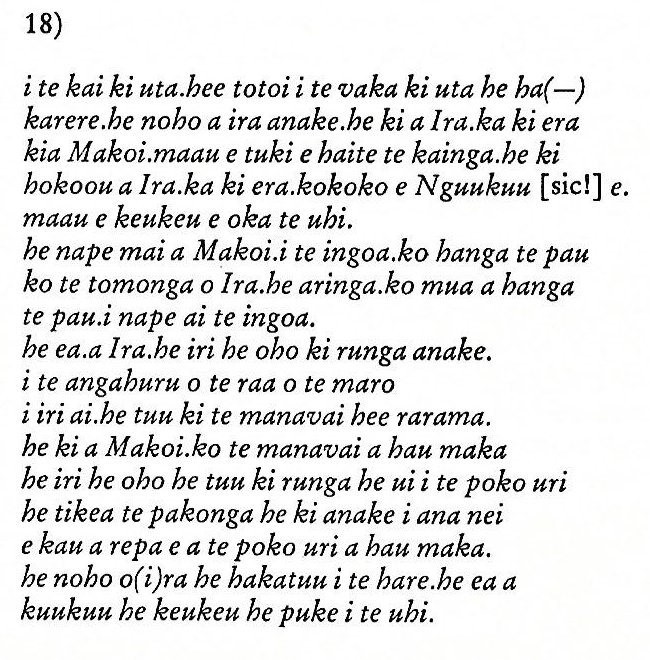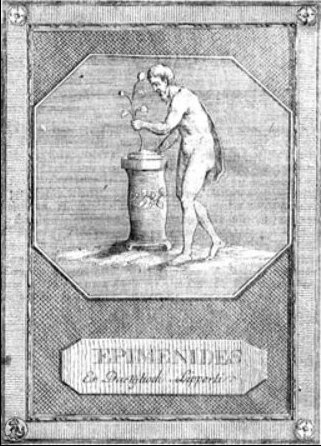
| kuhane.hokoou.he rarama he oho te vaka |
The canoe continued its exploration
and in a sweep [he vari] sailed on to Hanga Te Pau. |
| he vari ki hanga.te pau
he tomo ki uta. he too |
|
Uta. Higher up (from the coast, or from another
place); i uta era, further up, up there; ki î te îka i
uta, as there are lots of fish on the beach. Vanaga. 1.
Inland, landward; paepae ki uta, to strand, to run
aground; mouku uta, herbage. 2. To carry; uta mai,
to import; hakauta, to give passage. Campbell. |
|
E:18 |
| i te kai te uta.hee totoi i te vaka ki uta he
ha(-) |
They went ashore and took the food [te
kai] with them. They pulled the canoe onto the beach and
left it there. Ira sat down [he noho] with all the
other (companions) and spoke to Makoi [ka ki era kia Makoi]:
'You shall mark the land for me and make it known (by its
name)!'
After that, Ira spoke these words: 'This is the diggning
stick (? ko koko], Kuukuu. You shall work the land for me and
plant the yam roots [te uhi]!' |
| karere.he noho a ira anake.he ki a Ira.ka ki
era |
| kia Makoi.maau e tuki e haite te kainga.he ki |
| hokoou a Ira.ka ki era.kokoko e Nguukuu e. |
| maau e keukeu e
oka te uhi. |
| Keu. Communal enterprise,
work done in common: mo te keu. for the work done in
common (for instance: collecting food mo te keu, to give
to the helpers). Keukeu: 1. To work; to work long and
steadily: he-keukeu te aga; tagata keukeu henua, farmer.
2. To get ready, e.g. for a trip: ka-keukeu koe, ki oho
tâtou. get ready, we are going; ka-keukeu ki turu ki tai,
ki hî, get ready for going down to the sea, to fish. 3. To
approach (of rain): he-keukeu te ûa. Vanaga.
Oka. 1. Lever, pole; to
dig holes in the ground with a sharpened stick, as was done in
ancient times to plant vegetables; used generally in the meaning
of making plantations. 2. The four sideways poles supporting a
hare paega. Okaoka, to jab, to pierce, to prick
repeatedly. Vanaga. Digging stick, stake, joist; to prick, to
pierce, to stick a thing into, to drive into, to slaughter, to
assassinate; |
| He nape mai a Makoi.i te ingoa.ko
hanga te pau |
Makoi named the place Hanga Te Pau,
'the landing site of Ira'. So that they would remember (? he
aringa, literally, 'as face'), the open side [ko mua]
of Hanga Te Pau was given this name. |
| ko te tomonga o Ira.he
aringa.ko mua a hanga |
| te pau.i nape ai
te ingoa. |
|
Pau. 1. To run out (food, water): ekó pau te kai,
te vai, is said when there is an abundance of food or water,
and there is no fear of running out. Puna pau, a small
natural well near the quarry where the 'hats' (pukao)
were made; it was so called because only a little water could be
drawn from it every day and it ran dry very soon. 2. Va'e pau,
clubfoot. Paupau: Curved. Vanaga. 1. Hakapau, to
pierce (cf. takapau, to thrust into). Pau.: pau, a
cut, a wound, bruised, black and blue. 2. Resin. Mq.: epau,
resin. Ta.: tepau, gum, pitch, resin. (Paupau)
Hakapaupau, grimace, ironry, to grin. 3. Paura
(powder), gunpowder. 4. Pau.: paupau, breathless. Ta.:
paupau, id. 5. Ta.: pau, consumed, expended. Sa.:
pau, to come to an end. Ma.: pau, finished. 6. Ta.:
pau, to wet one another. Mq.: pau, to moisten.
Churchill. Paua
or
pāua
is the Māori name given to three species of large edible
sea snails, marine gastropod molluscs which belong to the family
Haliotidae (genus Haliotis), known in the USA as
abalone, and in the UK as ormer shells ... Wikipedia |
| he ea.a Ira.he iri he oho
ki runga anake. |
Ira got up. They all climbed to the top of the
hill. |
| Ea. To rise, to get up.
Ka ea ki táû rikiriki tâtou. Let's get up and play a little
game of war. Vanaga. To go out, to bring out; ea ki aho,
to send away; raa ea mai, the sun rises; ka ea, be
off. Churchill. Iri. 1. To go up; to go in a boat on
the sea (the surface of which gives the impression of going up
from the coast): he-eke te tagata ki ruga ki te vaka, he-iri
ki te Hakakaiga, the men boarded the boat and went up to
Hakakainga. 2. Ka-iri ki puku toiri ka toiri. Obscure
expression of an ancient curse. Vanaga. Iri-are, a
seaweed. Vanaga.
Ruga. Upper part,
higher part; when used as a locative adverb, it is preceded by a
preposition: i ruga, above, on; ki ruga, upwards,
mai ruga, from above. When used with a noun the same
preposition is repeated: he-ea te vî'e Vakai, he-iri ki ruga
ki te Ahu ruga, the woman Vakai went, she climbed Ahu Runga.
Ruga nui, high, elevated, lofty: kona ruga nui,
high place, elevated position, high office; mana'u ruga nui,
elevated thoughts. Vanaga. High up; a ruga, above;
ki ruga, on, above, upon; ma ruga, above; o ruga,
upper; kahu o ruga, royal (sail); ruga iho,
celestial. Hakaruga, to accumulate, to draw up. P Pau.,
Mgv.: ruga, above. Mq.: úna, úka, id. Ta.:
nua, nia, id. Churchill. |
| i te angahuru o te raa o te maro |
They climbed up on the tenth day of
the month of June ('Maro). They reached the side crater (te
manavai) and looked around carefully.
Makoi said, 'This is the Manavai of Hau Maka'. |
| i iri ai.he tuu ki te manavai hee rarama. |
| he ki a Makoi.ko te manavai a hau maka |
| Manavai. Hollow where
rainwater accumulates; anciently, small, round gardens,
preferably situated in low shady spots, where the mahute
tree was grown. Vanaga. 1. Brain. 2. Valley, ravine, river,
torrent, brook; manavai miro, orchard, Mq.: manavai,
valley, brook. Ta.: anavai, river, brook. It scarcely
appears that these are fully coordinate. In Tahiti anavai
has a clear etymology, ana meaning the bed of a stream.
In Rapanui and in the Marquesas mana most readily
associates with maga, as water in a forked bed.
Churchill. Mahute. A tree (Boussonetia papyrifera)
formerly more abundant on the island, the fibres of which were
used for clothing (see nua and hami). Vanaga. The
tree Broussonetia papyrifera, indispensible for all types
of fasteners (lines, twine, ropes, and rigging). Barthel 2.
Maute, paper mulberry (mahute G). P Mgv.: eute,
ute, id. Mq.: ute, id. Ta.: aute,
Hibiscus rosa-sinensis. Pau.: aute, id. Mahutehute
(mahute - tutu 1) bast cloth in the last stage of
preparation (maute). Churchill. |
| he iri he oho he tuu ki runga he ui i te poko
uri |
They climbed farther and reached the
top. They saw the dark abyss and the large hole (of the crater
Rano Kau). They all said, 'Here it is, young men [repa],
the dark abyss of Hau Maka.' |
| he tikea te pakonga he ki anake i ana nei |
| e kau a repa e a te
poko uri a hau maka. |
|
Tikea. To see, to perceive, to examine, to find;
(also: tikera). Vanaga. To see, to feel, to recognize, to
perceive, to know, manifest, to appreciate; tikea mai, to
appear, visible; tikea horahorau, to skim a book; tae
tikea, unknown, invisible, misunderstand, unperceived,
unheard; tikeahaga, science, a dream; hakatikea,
to announce, to make known, to prove, to propose, to prejudice,
to show, immodest; hakatikeahaga, instruction. Churchill.
Poko. 1. Fragrant; to
smell, to give off a smell: he-poko te eo, it gives off a
pleasant smell. 2. To hunt, to catch with a trap, to snare.
He-kî e Tori: maaku-á e-ea ki te manu, e-poko i te po i ruga i
te opata. Tori said: I shall go and catch birds at night, up
on the cliff. 3. Thunder (also hatutiri). 4. (Also:
pokopoko.) Hollow, hole, depression, any deep, concave
object; to leave in a hole, in a depression. Pokoga,
chasm; summit. Pokohata, female rat: kio'e pokohata.
Pokopoko, woman bent under the weight of her years: vî'e
pokopoko. Vanaga. 1. Sound of the sea; tai poko,
breakers. Pokopoko, to slap water. Mgv.: pokokina,
resonant, clear-toned. Mq.: poko, to slap the water in
imitation of drumming; pokokina, sound of water. 2. Rut,
beaten path. P Pau.: poko, hollow; pokopoko,
concave, to excavate. Mgv.: poko, to dig, to excavate, to
hollow out. Mq.: pokoko, to crack open; pokona, to
hollow out, to excavate. Ta.: poópoó, hollow, deep. 3.
Infernal; pokoga, hell, infernal cave; topa ki te
pokoga, to damn (lit: to go down to hell.) Mq.: pokona,
cavity, hole. Churchill. Pokopoko: 1. Womb. PS Sa.:
po'opo'o, clitoris. Mq.: pokopoko, pudendum muliebre.
2. Pokopoko vae, footprints. 3. Concave, deep,
ditch, mysterious; pokopoko ihu, nostril (Ta.:
poópoó ihu); pokopoko ke, fathomless;
pokopoko taheta, concave. Hakapokopoko, to
deepen. Chuchill.
Uri. 1.
Dark; black-and-blue. 2. Green; ki oti te toga, he-uri te
maúku o te kaiga, te kumara, te taro, te tahi hoki me'e,
once winter is over, the grasses grow green, and the sweet
potatoes, and the taro, and the other plants. Uriuri,
black; very dark. Vanaga. Uriuri, black, brown, gray,
dark, green, blue, violet (hurihuri). Hakahurihuri,
dark, obscurity, to darken. P Pau.: uriuri, black. Mgv.:
uriuri, black, very dark, color of the deep sea, any
vivid color. Mq.: uiui, black, brown. Ta.: uri,
black. Churchill. Uli, s. Haw., the blue sky; adj., blue,
cerulean, green; uli-uli, verdure; adj., green,
dark-coloured, black. Sam., Tong., Fak., uli; Tah.,
uri, blue-black, any dark colour. Fornander. |
| he noho o(i)ra he hakatuu i te hare.he ea a |
They made camp and constructed a
house [te hare]. Kuukuu got up, worked the ground, and
heaped up the earth for the yam roots [he puke i te uhi]. |
| kuukuu he keukeu he puke i te uhi. |

|

